Welcome to the week.
Here are the most notable items our editors and readers came across in the past seven days…
Cameras and racial justice: This deep dive from ProPublica on who gets tickets from automated cameras reminds us that it’s not nearly enough to install traffic cameras on high crash and high speed streets and call it good.
Built to fail: The “crappy bike problem” has been a thing for decades and now it has new relevance because a group of bike mechanics have come together to tell major retailers to stop making and selling them.
A truly “green” loop: “It’s about how we all want to live, breathe, and play together.” This story about how a group of friends came up with a real plan to create a vast low-car/carfree zone in Berlin has me thinking the folks behind Portland’s Green Loop are not thinking big enough.
Not so green: Newly published research from Europe shows that, at least in cities with good public transit, the use of shared e-bikes and e-scooters leads to more greenhouse gas emissions because they tend to replace walking and transit trips.
ODOT knows: A notorious stretch of an ODOT-owned road in Corvallis where two people died in 2019 in the same crosswalk has led to another lawsuit against the agency that claims they were negligent in not making it safer.
Advertisement
What about bike theft? Faced with an epidemic of catalytic converter thefts from cars, Oregon lawmakers have reacted with a comprehensive new law they say will end the practice. Makes me wonder where this type of high level response is to the epidemic of bike theft.
It’s all about infrastructure: A major study in Melbourne, Australia (based on PBOT staffer Roger Geller’s insights) found that 78% of survey respondents said they would like to bike more but are afraid of traffic conditions.
Heat islands and parking lots: Catie Gould of Sightline delved into the strong correlation between big parking lots and deadly heat waves in places like the southeast Portland neighborhood of Lents.
Street bike culture: This story in the Portland Trib about the removal of a homeless encampment in northwest Portland has some revealing insights into one man’s bike repair business.
Get through winter: Don’t miss Madi Carlson’s best tips for surviving Portland’s cold harsh winter.
Our Video of the Week is this joyous Streetfilms look at the burgeoning cargo bike culture in NYC:
Thanks to everyone who sent in links!



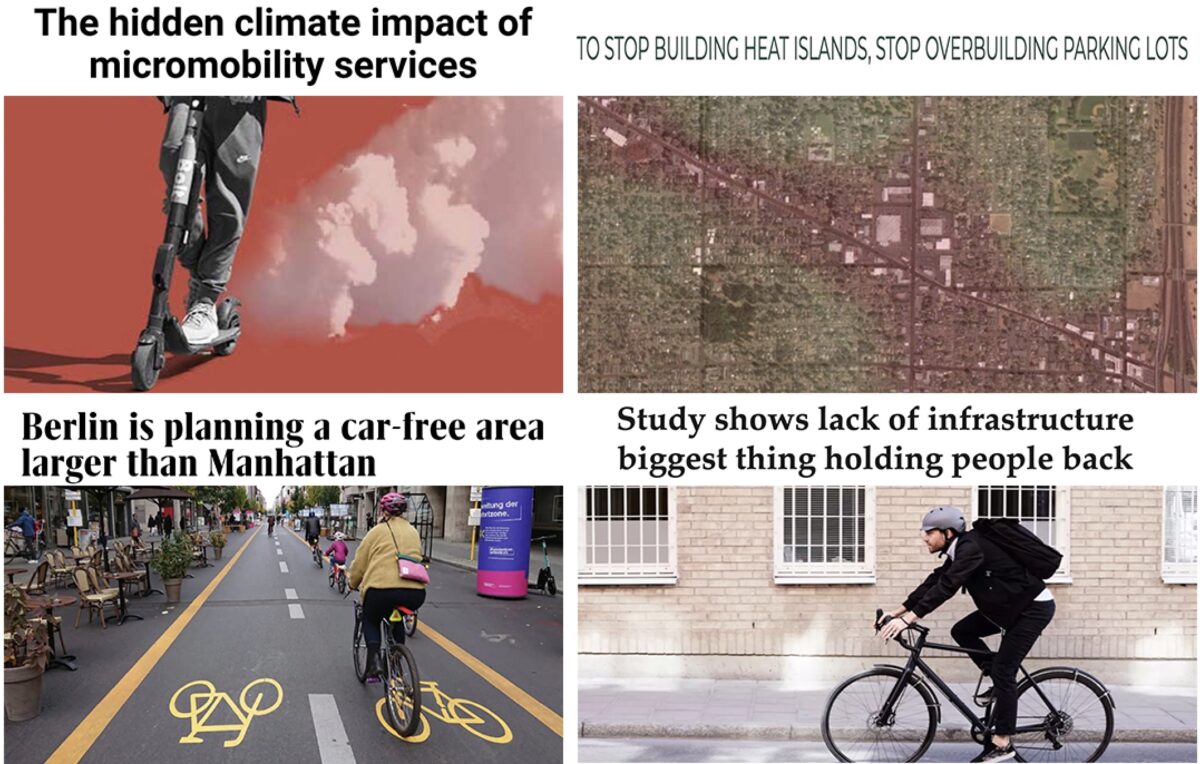
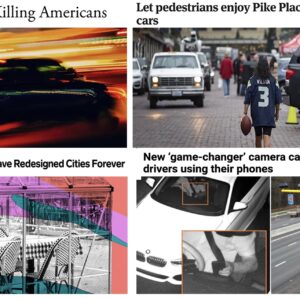
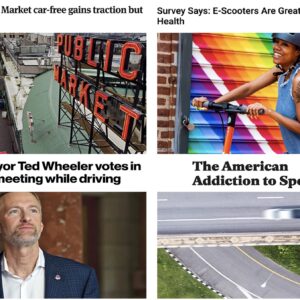
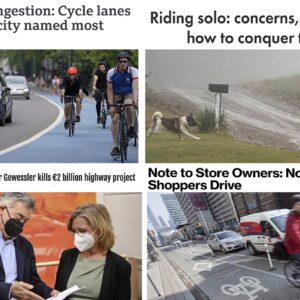
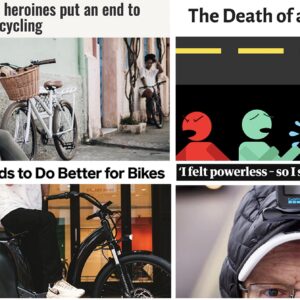
Thanks for reading.
BikePortland has served this community with independent community journalism since 2005. We rely on subscriptions from readers like you to survive. Your financial support is vital in keeping this valuable resource alive and well.
Please subscribe today to strengthen and expand our work.
With regard to parking lots:
American cities in general have way too many parking lots. But they’re the symptom, not the cause. The cause is unfettered suburban sprawl and construction of single-family zoning/homes without the necessary amenities to enable a car-light lifestyle. We need to fundamentally change our zoning and housing paradigms, and then work to get rid of all the unnecessary parking lots and wide streets. To just remove parking lots without providing alternatives would be addressing the symptom without addressing the cause.
That’s not to say I don’t support removing the lots and converting them to either greenspace or multi-use complexes as soon as possible (I strongly do), but we cannot expect people to stop driving when they do not have all necessary amenities within walking distance of their residences. And we need to make it illegal to build single-family homes without, at minimum, grocery stores, gyms, restaurants, parks, and trails within a mile walk from every residence. That is how we get away from a car-dominant lifestyle.
This seems doubly true for multifamily housing.
Oh, I 100% agree. But it’s overwhelmingly single-family housing that’s being built in these unwalkable areas.
Totally agree. So many of the problems in Portland that seem like transportation issues are actually land use issues. If you don’t have a lot daily needs met within a short distance, then it’s very reasonable to drive if you have the means to do so. Providing non-driving alternatives will only convince a small percentage of people to actually switch. The best solution is to bring the destinations closer to the people, so that walking or biking is the obvious way to get to those places. And if businesses are small and mainly cater to the local neighborhood, they have no reason to build giant parking lots. I’m reminded of how in much of Europe and Great Britain you have these tiny tiny grocery stores all over the place and not as many mega-stores as we have here.
Exactly. The idea that every American should have a single-family house in the burbs is the cause of so, so many problems in society these days.
It’s not just transportation/environmental problems that our horrible land use is causing. People are more isolated and tend to see others as outsiders because they live in their own bubbles. People are in poorer physical shape because they drive everywhere instead of walk to places. People have less outdoor access because everything is private land waiting to be developed. There are more housing shortages because building single-family homes can by definition only house a single family rather than providing large numbers of homes to everyone.Really, if there is one single thing that can be done to improve American society, it’s reducing suburban sprawl.
And how are you going to persuade the majority of the population that suburbs = evil? It’s one thing to say it in the echo chamber of a bike blog, but say that to the voting/tax paying citizens out there and they’ll likely just roll their eyes and say to themselves “another wacko environmentalist/biker”.
That’s unfortunately the issue with us that have similar views, but we are such a minority and just a blip in voting power. Things that appeal to a wide voter segment are likely to gain traction, where as ideas that appeal to <5% aren't.
I'm one of those "wacko environmentalists" but as I've aged I realize that the reality is the likelihood of my views becoming rules of law are very very slim. So, I've tempered my own retoric to try and reflect what fellow voters will vote for.
No one has all the answers, least of all myself. But there you have it.
That is exactly the issue. And it’s why we have to take small steps rather than try for large steps at once. To give an example, some people here seem to think that banning cars is actually a possibility. Spoiler alert: it’s never going to happen. I feel the same way about banning single-family housing; it’s never going to happen. But we can take smaller steps, such as placing severe emissions regulations on cars, or eliminating single-family zoning. Both of these actually have been enacted into law in places. They aren’t perfect, but are steps in the right direction.
Maybe not in the long term, but if your goal is to maximize the reduction in crashes (and thus lives saved, injuries reduced, and economic harm prevented) it is. If tickets are handed out in a geographically disproportionate manner, then so is the benefit in terms of people not injured or killed. Think of enforcement as protection for street users, not as some sort of arbitrary punishment of the innocent. Locating a limited supply of equipment based on greatest need is the most ethical manner of allocation.
I firmly believe it is possible to drive in a manner that does not result in tickets from automated enforcement. In that regard, exposure to such traffic fines is voluntary.
PS Of course, the longer term solution is to make dangerous roads safer, but I see a moral imperative to save lives and reduce injuries in the short term.
Of course they do. Is this in any way a surprise?
Another unsurprising finding. Sadly, policies promoted by Sightline have resulted in landuse policies that make developing a large and healthy tree canopy more difficult, which, over time, will only increase arboreal disparities between neighborhoods.
Which policies in particular?
The policies that allows removal of healthy mature trees, and encourages development so dense there is no room for any more other than the spindly street trees that the city now allows. Visit the more treed areas of the city, and, often, the big trees are on private property.
It won’t really be that long before the boomers are gone, and we have a glut of housing as we lament the lack our present failure to plant another generation of large trees.
Ah. I see. So you oppose policies that promote density, which allow for higher use of transit, walking, and cycling. Because in building dense housing some trees sometimes get cut down.
By extension you support single family zoning that supports car dependency and the need for big parking lots. Got it.
No, I support policies that allow us to have big trees around our dense developments, as well as increasing the number of parks, grocery stores, transit options, and other public amenities where we add more people.
Sounds like a devil’s bargain. If you require big set-backs and less buildable area to have larger trees, you’re going to have less density, more sprawl, and ultimately a bigger environmental impact. Doesn’t sound worth the trade-off.
I disagree that our our only options are suburban sprawl or concrete jungle, but my original post was intended to point out the irony of Sightline writing about the issue.
If you advocate for policies that directly result in a loss of trees, then please don’t complain about a lack of trees.
Maybe the politicians in Chicago need to institute income level based fines instead of just the same fine for everyone.
So the person that breaks the law and makes $25K/year pays, just for an example, $100 for a fine.
A person that makes $250K/year pays $1,000 for a fine.
Seems like I’ve seen some countries in the world that use this method quite successfully.
If Chicago is anything like Portland it would have to change at the state level which I imagine is much more difficult to do. I agree though country wide that would be a much more equitable system. We also need to make it illegal to not identify who is driving a vehicle registered in your name so that we don’t have to positively identify the driver.
It already is; if the court wants information from you, it can compel you to provide it.
It’s literally written into the Oregon Revised Statute that the owner can have the ticket dismissed if they’re not the one driving the vehicle. In that case there would be no court appearance and nowhere does it compel the owner to identify who was driving.
Ok, I’m convinced; I think the court should be able to compel testimony as it can in any other matter before it. I do not think the owner of the vehicle should be cited for speeding if there is no evidence they were actually driving, as many here have in the past opined.
Is there any evidence that current fines insufficiently deter people earning $250K/year from driving in an illegal manner? If so, raising the fines for those people will not accomplish anything.
I believe punishment should be based on your conduct and the threat you pose to others, not your occupation, education, or other irrelevant factors.
I’m confused. You say that if evidence exists to support current fines not deterring people earning $250k/year, higher fines won’t deter them, either. On what basis have you concluded that?
While editing my message I screwed it up. I am skeptical of the claim that current fines are an insufficient deterrent. I believe the real problem is insufficient chance of getting caught.
Got it. I thought it may have been a typo. Thanks for clarifying.
I think regardless of the chance of getting caught and whether current fines are insufficient, I do think a fine at a high enough amount (for any person, whatever that is) would likely change one’s weight given to that chance (no matter how slight) in their factors informing whether to illegally drive.
That’s the same logic behind making criminal sentences stiffer. It makes sense, but it’s not how the human brain works. Likelihood of sanction is more important that severity of punishment, as illogical as that may be.
If fines are too low, we could just double the fine after every offence to deter serial offenders. My desired outcome is safer roads, not finding creative ways to punish those who are financially comfortable.
Seems I was unclear again. I only tried positing that human brains tend to give greater weight to a risk’s possibility if that risk’s consequence reaches a certain threshold.
I was not trying to say the consequence’s severity ever outweighs the odds, and regarding that, given the way the greatest white-collar and war criminals rarely face consequences, I don’t think what you said is illogical.
However, if you seek safer roads, but don’t believe punishment is a worthy approach, then starting at too-low fines and doubling seems out of line with your aim since that first fine is essentially a shield before the offender is susceptible to a fine that might deter.
All that said, increasing fines is not creative, as you suggest, but I wasn’t advocating for it, anyway. I’d rather move toward removing the possibility that people can drive illegally…provided our laws governing driving are sensible…which will likely always be up for debate.
“Outer suburbs are losing out”
So if the Australian article is based on Geller’s insights, East Portland is a prime example. So true Roger. Let’s build better infrastructure in the Central city on East Portland’s dime (10’s of millions of $).
How is it on East Portland’s dime?
Fixing Our Streets fuel tax and FOS2 fuel tax. We’ve had very few active transportation projects completed in East Portland since the FOS fuel tax was passed by voters. There have been some projects funded and built in East Portland, but the lack of tracking of said funds allows PBOT to funnel more funding to the inner city. People simply have no alternative but to drive. The longer PBOT postpones building active transportation infrastructure in East (and West) Portland the more revenue generated.
Another issue is the fact that the central city’s infrastructure is ageing and in need of repair so more of FOS funding goes to fix streets for driving. SE 50th is a good example.https://www.portland.gov/transportation/fixing-our-streets/fixing-our-streets-projects
From 2011 through 2021 East Portland received about 17% of PBOT transportation funding per capita, but make up 25% of the city’s population.
It’s not rocket science……
Thanks for the post. Re Berlin article: “this is not just a revolution toward electric vehicles, but toward the removal of vehicles in general.” The pro freeway crowd are starting to make the argument that no change is needed other than electrification. But this ignores four key facts. One, freeways still have an enormous health, environmental and social impact regardless of how vehicles are powered. Two, manufacturing and charging electric cars at scale will have an enormous environmental impact, which may worsen climate change in the end. Three, preserving car-centric transportation in the name of electrification will also continue to subsidize and prolong the use of climate-destroying internal combustion. Four, public transportation, walking and biking are simply cheaper and more efficient, meaning the rich will eat Teslas while the poor get run over.
“Bike repair business”.
Business seems to be booming lately!
Oh, so now single-family houses are the enemy? So it’s okay if the world’s population increases ten-fold, as long as we don’t put those people in single-family houses?
Where is it predicted that the current global population will increase tenfold?
“…he accepts bikes without asking if they are stolen and fixes them up to sell and trade…”
This guy may work on bikes, but he’s not a ‘bike mechanic’, he’s simply fencing stolen property.